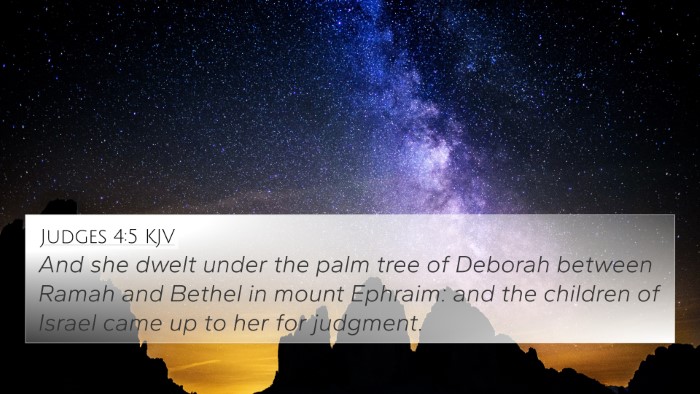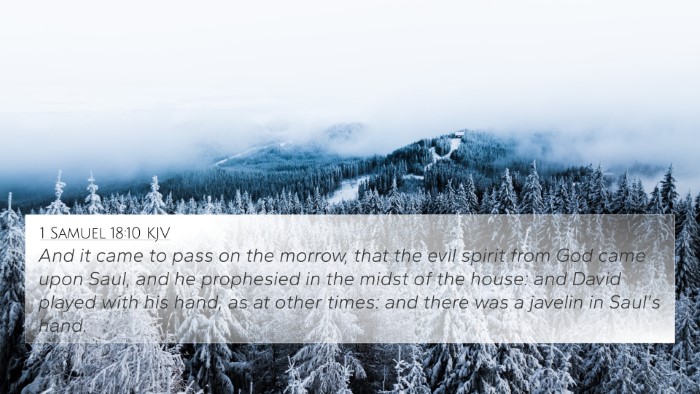Understanding 1 Samuel 22:6
1 Samuel 22:6 states: "When Saul heard that David and the men who were with him had been discovered, now Saul was staying in Gibeah, under a tamarisk tree in Ramah, with his spear in his hand, and all his servants standing about him."
This verse depicts a pivotal moment in the narrative of David and Saul, illustrating Saul's jealousy and the tension that ultimately leads to David's rise and Saul's decline. Here is a combined interpretation from various public domain commentaries.
Commentary Insights
-
Matthew Henry: He emphasizes that Saul’s position reflects his growing paranoia and insecurity. Saul is depicted as a king who is losing focus on his role, consumed instead with his need to eliminate David, whom God has chosen as the next king. Henry draws parallels to the dangers of unchecked ambition and jealousy.
-
Albert Barnes: Barnes notes that this scene exemplifies Saul's public identity versus his private emotions. He was ostensibly a ruler, yet he is isolated with his fears. This isolation is indicative of his mental state, plagued by the knowledge that his kingdom is slipping away due to his own failings. It serves as a warning of the consequences of pride and disobedience to God.
-
Adam Clarke: Clarke provides context around the location, noting that Gibeah was Saul's tribal city and that his choice to stay there is about reclaiming power. He mentions the symbolic nature of the tamarisk tree as a reminder of past times of safety and blessing now overshadowed by the threats to his kingship. Clarke suggests that this moment foreshadows the greater conflicts that will arise due to Saul's incessant pursuit of David.
Thematic Connections and Cross-References
1 Samuel 22:6 connects with several other passages in the Bible that illuminate the themes of kingship, jealousy, and God’s eternal purpose. Here are notable cross-references:
- 1 Samuel 16:7: Highlights God’s choice of David over Saul, which emphasizes the theme of divine election and the danger of man’s judgments.
- 1 Samuel 18:8-9: Discusses Saul's jealousy when the women sang of David's victories, illustrating the catalyst for Saul's subsequent actions against David.
- 2 Samuel 1:11-12: This later recounting of Saul's death reflects the completeness of his tragic story and despair as a result of his earlier choices.
- Psalms 52:1-5: This Psalm, attributed to David, provides a reflection on the fate of the wicked and serves as a direct commentary on Saul’s misguided pursuits.
- Proverbs 14:30: It speaks about the destructive nature of envy, complementing the situation between Saul and David.
- Isaiah 41:10: Offers reassurance of God’s presence in times of distress, a message relevant for David as he was on the run.
- Romans 12:19: Commanding believers not to take vengeance, this verse connects to the future actions of both Saul and David.
Practical Application for Bible Study
For those engaging in a study of 1 Samuel 22:6, consider employing various Bible cross-referencing tools:
- Utilize a Bible concordance to find keywords and themes that link this verse to others.
- Engage with a Bible cross-reference guide to explore how this narrative fits within the broader biblical context.
- Review a Bible chain reference system to see thematic connections across different passages.
- For deeper analysis, adopt cross-referencing Bible study methods that encourage textual comparisons.
Conclusion
In summary, 1 Samuel 22:6 serves as a poignant narrative about the volatile relationship between Saul and David, reflecting themes of jealousy, loss of power, and divine purpose. By engaging with the rich fabric of cross-references and utilizing tools for Bible cross-referencing, readers can uncover deeper insights and applications for their lives.
As you study this verse, consider the impact of Saul's choices and how they resonate through scriptural history, inviting reflections on your own life and faith. The connections between Bible verses enrich our understanding and offer profound insights into God's continual work throughout biblical narratives.







